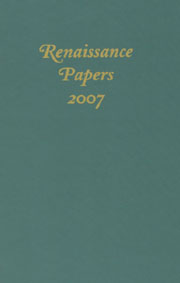Book contents
- Frontmatter
- Contents
- Renaissance Papers
- John Donne and the Practice of Priesthood
- Charity, Halifax, and Utopia: The Disadvantageous Setting of Thomas Browne's Religio Medici
- Presbyterian Church and State Before The Solemn League and Covenant
- The Flaw in Paradise: The Critique of Idealism in Margaret Cavendish's The Blazing World
- “Conceited portraiture before his Book … to catch fools and silly gazers”: Some Reflections on Paradise Lost and the Tradition of the Engraved Frontispiece
- “But Smythes Must Speake”: Women's and Commoners' Voices in the Mirror for Magistrates
- Fit for a King: The Manuscript Psalms of King James VI/I
- The Suicide of Lavinia: Finding Rome in Titus Andronicus
- The Language of Gods: Rhetoric and the Construction of Masculinity in Julius Caesar
“Conceited portraiture before his Book … to catch fools and silly gazers”: Some Reflections on Paradise Lost and the Tradition of the Engraved Frontispiece
Published online by Cambridge University Press: 12 September 2012
- Frontmatter
- Contents
- Renaissance Papers
- John Donne and the Practice of Priesthood
- Charity, Halifax, and Utopia: The Disadvantageous Setting of Thomas Browne's Religio Medici
- Presbyterian Church and State Before The Solemn League and Covenant
- The Flaw in Paradise: The Critique of Idealism in Margaret Cavendish's The Blazing World
- “Conceited portraiture before his Book … to catch fools and silly gazers”: Some Reflections on Paradise Lost and the Tradition of the Engraved Frontispiece
- “But Smythes Must Speake”: Women's and Commoners' Voices in the Mirror for Magistrates
- Fit for a King: The Manuscript Psalms of King James VI/I
- The Suicide of Lavinia: Finding Rome in Titus Andronicus
- The Language of Gods: Rhetoric and the Construction of Masculinity in Julius Caesar
Summary
ANYONE who has examined the first edition of Paradise Lost knows that it is a disarmingly modest little book. Indeed, the disproportion between the physical object and the commentary it has generated is astonishing to contemplate. It is also true that the little book is the work of the same poet whose 1645 volume was issued by Humphrey Moseley with an engraved frontispiece and fulsome title page, thereby inviting readers to associate the author with some of Moseley's Cavalier poets and to view him as the handmaid of the muses, four of them at least. But when his great epic poem appeared, it was without such ornament.
There are a number of obvious explanations. The poet of 1645 still had his sight; the poet of 1667 was blind. Moreover, Milton had had his issues with William Marshall over the frontispiece to 1645, perhaps suggesting that artists were not to be trusted even with relatively simple tasks. Furthermore, the poem's otherworldly nature challenges visual conceptions and may easily make pictorial representations look silly, as a glance at some of the illustrations from later editions makes instantly clear. To the extent that Paradise Lost is a counterblast to Leviathan, the deliberate absence of a frontispiece might be taken as a gesture against Hobbes. Leviathan in its turn was a counterblast to Eikon Basilike, with its famous frontispiece of the royal martyr, and we should recall that Milton was the writer who in Eikonoklastes spoke mockingly of “quaint Emblems and devices begg'd from the old Pageantry of some Twelf-nights entertainment at Whitehall.” Perhaps most important of all, it is the Protestant emphasis on the Word that is crucial in Milton’s thinking.
- Type
- Chapter
- Information
- Renaissance Papers 2007 , pp. 69 - 82Publisher: Boydell & BrewerPrint publication year: 2008

